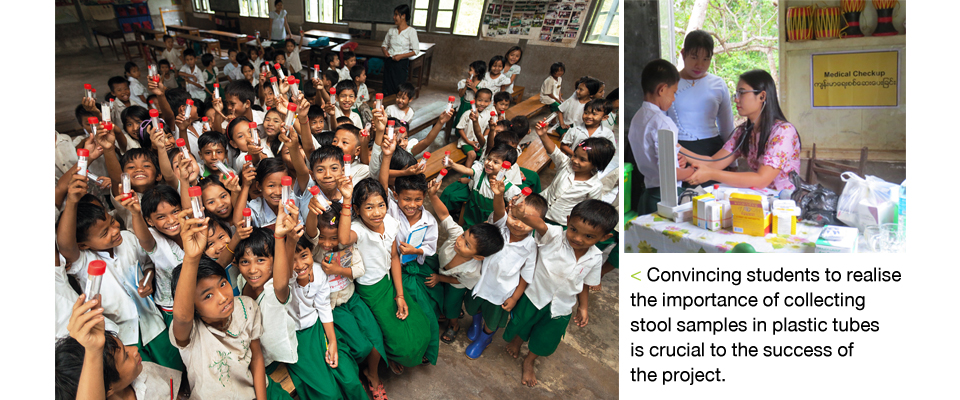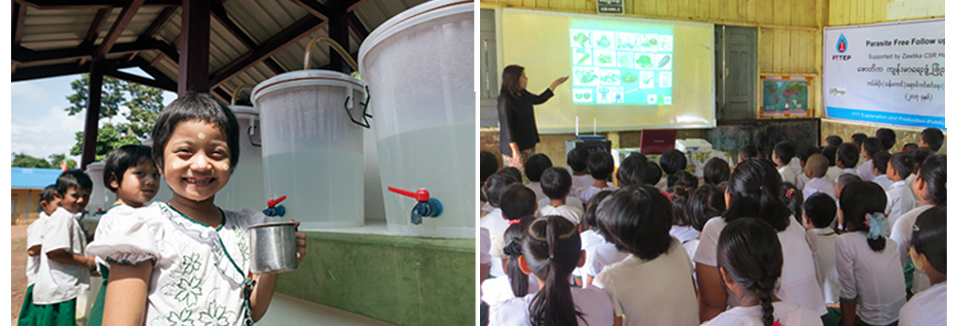Parasite Free School Project

In 2009, PTTEP undertook a health survey of the surrounding areas around PTTEP operation sites in Kanbuak, Tanintharyi Region to study how it could assist in improving the quality of life of the local community near its operations on the southern coast of Myanmar. PTTEP enlisted the expertise of Mahidol University’s Faculty of Tropical Medicine to collect health data of the locals; the data collected showed that a large number of villagers suffered from malnutrition, which was especially prevalent among children. More shockingly, over 60 percent of the local population had intestinal parasites.
Armed with this information in 2010, PTTEP initiated the “Parasite-Free School Project” in two pilot schools aimed at improving the quality of life by reducing parasitic infection among the school children in the communities living near the Zawtika Project’s natural gas pipeline routes.

The study discovered that the main cause of intestinal parasites in the communities arose from preventable unhygienic behavior; ranging from consuming food without first washing their hands, walking barefoot, unsanitary outdoor latrines, lack of clean water and an overall lack of general knowledge on cleanliness. The Myanmar authorities had tried to solve the problem by prescribing anthelmintic drugs, but this had not solved the issue and the number of patients continued to rise. Actual efforts to address the root causes related to hygiene had been minimal, especially among primary school age children, a group who are the most susceptible to disease.
The “Parasites-Free School Project” pilot sought to address this through educating the local communities on prevention of intestinal parasites and promotion of public hygiene.
The project is further supplemented by health check programs in three main areas: general health, nutrition levels and the treatment of parasites. Two teams comprising 4 medical professionals in each provide health coverage for the large number of schools in the project, performing visits every 6 months to address health issues based on criteria outlined by the World Healthcare Organization. The first visit usually takes place in June of each year as an introduction where the children learn about personal healthcare regimes, sanitary knowledge, proper use of toilets and the risks from intestinal parasites. At the same time the medical team collects stool samples from the children before administering appropriate treatment where needed. The second visit, which is usually around November of each year, the medical teams follow up on results as well as evaluate nutritional conditions, all of school children which are provided free of charge.
In addition to this the project distributes “Health Report Books” to all students so they can record symptoms of illness to assist the medical teams in tackling long-term health problems.


During the first year of the pilot project, the medical team found that only half of the students cooperated. The locals and even the teachers regarded the process as dirty. But it is the lack of public hygiene that was contributing to the poor quality of life and spread of parasitical illness

Convincing the children to change their attitudes is key and to accomplish this the project teaches in a fun and entertaining way using cartoon style information boards to spread knowledge, raising children’s awareness of health issues with group discussions for example asking them
what happens when they do not wear shoes, or why they have to clean themselves and wash their hands after using the toilet.
And gradually after 6 months, the team saw progress as the 232 children in the two pilot schools became healthier and exhibited less of the previous health issues. As other villages became aware of the project and its benefits other schools asked to be included in the project and four years on from the initial pilot (2010-2014) the number of schools in the project increased to 35 villages promoting hygiene and health care to over 6,000 students.
Most importantly the infection rate of parasitic illness declines sharply from 41.5 percent in the first year (2010) to 15.4% in 2014.
During 2015-2017 Parasite-Free Follow Up Program focuses on the 10 schools out of 35 schools in first phase that still have high rate of illness and aims to reduce the risk of repeated parasitic infection. The result shows that the infection rate decreased by 3%.
In 2018, the program covers 3,471 students from 35 schools along Zawtika pipeline corridor and result of the 2nd follow-up campaign shows that the parasite infection rate decreased by 4%.
Compared with the 2019 program which covers 3,505 students, the second follow-up campaign shows that the parasite infection rate decreased further from 8.6% to 7.8%.

Besides providing treatment and raising awareness, PTTEP also improves general public hygiene, by building high-standard toilets for schools and providing clean drinking water to reduce the risk of parasitical diseases. Even though patients are free of parasites, chances are that they contract them again if they live in an unhealthy environment.

In the future, the “Parasites-Free School” Project will also organize other activities to increase awareness and promote healthy living among locals. Among them is a healthy school contest, in which the winner is the school that has the lowest number of children with intestinal parasites. The goal is to spark a movement for better healthcare, expanding from children to family and the whole community.
In the end, a sound body is a sound mind, which leads to happiness in a life that may lack other opportunities.
Besides the Bronze Stevie Award for Innovation in Community Relations from Asia-Pacific Stevie Awards, the final reward is a healthier society with a sustainable long-term development



 ...the sea has become our home and so we are conscious of our responsibilities...
...the sea has become our home and so we are conscious of our responsibilities...




 PTTEP is E&P company in Thailand, exploring for sustainable sources of petroleum for the countries we operate
PTTEP is E&P company in Thailand, exploring for sustainable sources of petroleum for the countries we operate
 SIGN IN
SIGN IN SEARCH
SEARCH







